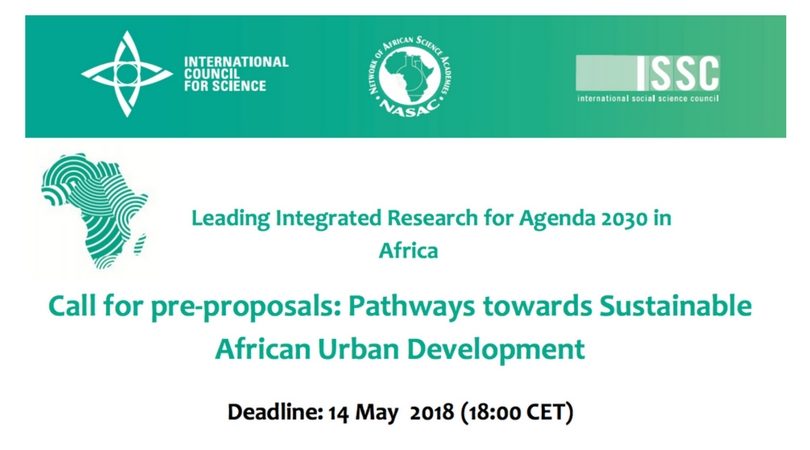Deadline: May 14, 2018
The International Council for Science (ICSU) invites early career scientists from across Africa to submit collaborative research proposals on integrated approaches for sustainable urban development in Africa. Up to eleven collaborative research projects across Africa will receive funding for research that will explore integrated approaches for sustainable urban development in Africa.
As part of the 5-year “Leading Integrated Research for Agenda 2030 in Africa” programme, the International Council for Science (ICSU), in partnership with the Network of African Science Academies (NASAC) and the International Social Science Council (ISSC) will support collaborative research projects across Africa (to the value of up to 90,000 Euro each over two years) that will explore integrated approaches for sustainable urban development in Africa.
ICSU invites African early career scientists to submit research proposals that apply a systems approach to analyzing urban processes in Africa. These projects are expected to examine the inherent complexity of cities, to explore the interconnections, trade-offs and synergies between different dimensions of urban systems, e.g. governance, human and social capital, environment, economic systems and infrastructure.
The call for pre-proposals aims to identify collaborative research projects in Africa that bring together African early career scientists from different scientific disciplines and key stakeholders (e.g. local authorities, policy makers, built environment professionals, the private sector, civil society and citizens) in research co-design and co-production.
Eligibility
- This call is open only to early career scientists who are nationals of an African country, and who are based at organisations in Africa. Applications led by early career scientists from West and North Africa are strongly encouraged.
- Applicants should have no more than 10 years work experience following their PhDs or equivalent research experience. If an applicant does not have a PhD, evidence proving research experience should be provided.
- The programme aims to foster research collaboration across Africa, therefore each project should involve 2 African countries. Ideally at least one member of the research team should be based in a low income country (based on OECD ODA’s ranking) or the inclusion of collaborators from the poorest parts of middle income nations should be demonstrated.
- Each application should demonstrate its relevance to the thematic focus of the call.
- Each research team should include minimum one social and one natural scientists
- Pre-proposals should illustrate steps that were taken to co-design research questions with key stakeholders. Plans of engaging these stakeholders in knowledge co-production should also be outlined.
- Each application should include information about the Principal Investigator and should indicate the name of the collaborator(s) and attach a letter confirming his/her interest in research collaboration.
- The institution under which the project will take place should be based in an African country. This institution should provide a letter of support for the project, if it’s successful. A senior scientist from this institution who will supervise the applicant should also provide a letter of support. Applications which do not include such letters will not be considered.
- All projects must include a university partner.
- Applications can be written in English or French. However, if the project is successful, all progress reporting will need to be done in English. However, it is not necessary that the research be conducted in English or published only in English.
- Applications which exceed the character limits (see below) will not be considered.
How it works
Following the call, 35 pre-proposals will be selected, representatives of which will be invited to attend a training event on integrated research, which will take place on 3-7 September 2018 (location tbc). This training aims to strengthen scientific capacity to undertake this form of research, to enable researchers to build meaningful inter- and trans-disciplinary projects, to support the development of full proposals and to strengthen science communication skills.
Applicants should be aware that if their pre-proposals are selected, they are expected to attend this training. The programme will cover associated travel and subsistence costs.
Participants of the training will then be given about two and half months to submit full proposals (deadline is 23 November 2018, 18:00 CET). In February 2019, up to eleven collaborative research projects across Africa will be awarded up to 90,000 Euro each over two years.
Application
The deadline for pre-proposal submission is 14 May 2018 (18:00 CET).
Submission of pre-proposals and relevant documents may only be made using the online application form.
For more information, visit International Council for Science.

